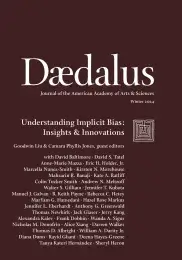Seeing the Unseen
Implicit bias has been described as the “tendency for stereotype-confirming thoughts to pass spontaneously through our minds . . . leading to discrimination.”1Decades of research by social scientists have yielded substantial evidence that measurable, pervasive, and consequential implicit biases exist. This research shows that we can all hold implicit biases, even in the absence of overt prejudice, heartfelt bigotry, or, as we call it in the law, intent. Imagine navigating the world with harmful, stereotype-confirming thoughts deeply embedded in your subconscious framing your day-to-day interactions. Now, imagine navigating the world as someone on the receiving end of implicit bias. Imagine your day-to-day interactions with people who have harmful, stereotype-confirming thoughts about you. Imagine those people are not just passersby on the street, but people you engage with over the course of your lifetime: your doctors, teachers, neighbors, judges, employers and coworkers, local law enforcement officers, and so on.
When you think of implicit bias this way, it is much easier to conceptualize it as a threat to our individual and collective livelihood, including the bedrock principle of equal justice under the law. At its core, the legal profession is based on judgment and discretion. Unfortunately, statistics prove that implicit biases are widespread and have infected both judgment and discretion. Black motorists are almost two times more likely to be searched, despite statistics suggesting they are less likely to be carrying illegal contraband.2 Yet Black motorists are less likely to be stopped at night, when it is more difficult to discern the race of a motorist.3 Despite similar rates of drug involvement, Black people are disproportionately incarcerated for drug offenses.4 As a sad acknowledgment of this reality, Black parents all across America continue to sit down their Black children to explain how they should interact with police if they are ever stopped or confronted in a manner that feels unwarranted.5
Studies have shown that partisan actions based on implicit biases may impact the voting process. Minority communities disproportionately have fewer polling locations and older voting machines.6 A study about the 2012 elections showed that state legislators were less likely to respond to email inquiries regarding voter identification requirements when sent from an account that bore the name of a fictional Latino person versus a fictional white person.7 Moreover, a survey of the 2008 elections found that the race of both the poll worker and the voter affected the rate at which voters from different groups were asked for identification, but overall, Black and Hispanic voters were asked to show picture ID more often than white voters.8
Our founding principles commit us to the ideal of equal justice under the law. These statistics reflect a different reality—that we have not fully realized that principle. Our efforts to overcome implicit bias begin with a commitment to understanding the problem. We must tirelessly study disparities to understand both the source and scope of implicit bias, and ferret out the ill-effects, wherever they may lie. That is why publications like this issue of Dædalus are so important. We are unable to address things we do not understand.
We must then commit ourselves to education and solutions. We must show that our institutions take seriously their most solemn responsibility: equality under the law. We must ensure that everyone understands the importance of being aware of, and having strategies to counteract, the unconscious biases we all hold. This is not easy work, and the effects of implicit biases will not disappear quickly. But this work deserves our steadfast attention, as we all hold a stake in the pursuit of a more perfect union.
